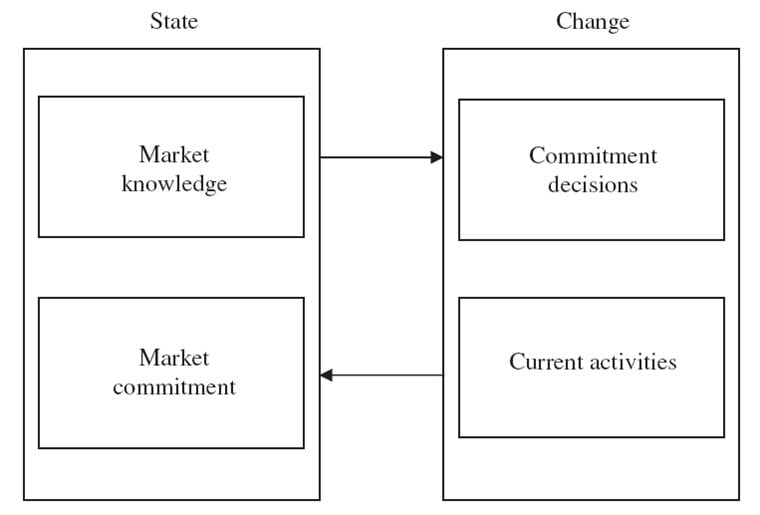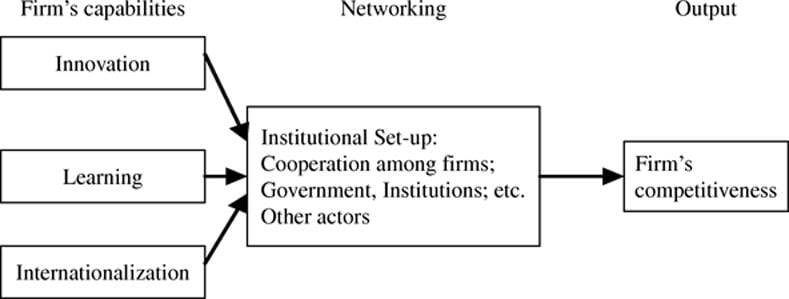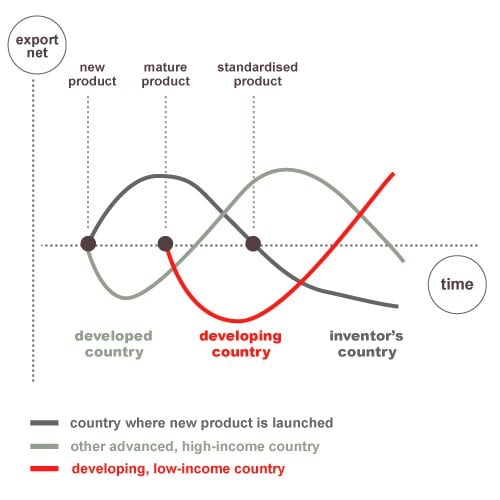Firm Internationalization
In the present condition of contemporary world, the active participation in international division of labor is a significant factor in the growth and development of every nation. In today's era, international business development tends to become a condition for existence of companies, irrespective of their size or scope of activity and the outcome is that globalization and internationalization contain the fundamental attribute for countries. A firm's decision to go international could be driven by various factors and is one of the probable strategies which are being used by many of the corporations to augment its sale and size of companies by enhancing their profitability, market share and becoming a leader in industry.
In internationalization, exporting as a business strategy provides various benefits for diversification and reduces its dependence on its local market.
In this context, the present research report has been undertaken to analyze the significance of internationalization and the major export barriers that firms have to face while making decision for global operations. In current report, the area of study that has been selected is China and the various barriers that a company faces to enter the Chinese market. In the report, both secondary and primary analysis have been undertaken, The research would be undertaken in a Norwegian company named Nova Sea, which mainly deals in fish farming of Salmon all around the world.

Chapter 1: Introduction
Introduction
Economic liberalization all around the world and the general phenomenon of internationalization have offered incredible amount of accessibility in various markets and investment and outsourcing opportunities for large multinational corporations in developing economies. An instantaneous consequences of internationalization process has received limited amount of research attention and is the developing presence of companies from developing countries in an incorporated global economy.
Focus and Purpose of Research
The main focus area of this report is to analyze various export barriers in internationalization of firms. In this research, the area of study selected is the international market and research has been undertaken in a Norwegian company that mainly deals in the farming of salmon fish. The researcher initially discussed a case of this organization and then undertook primary research to acquire deep information about the barriers and several opportunities that are available for this firm to make its presence in the international market (Jones, 2009).
Conclusion
Here it could be stated that this research report would provide ample of information and benefit about international trade that has evolved gradually over the period of time. International business operations are dependent in large measure on the economic and diplomatic relation between nations and development of transportation technology and infrastructure facilities.
Chapter 2: Literature Review
Introduction
Literature review helps in focusing on the research question by articulating the knowledge gap, and it gives attention to assessing the previously published articles and literature on the prescribed topic. The literature review section aids in seeking information from various sources and undertaking a critical analysis in the area of research. In the present research report, focus has been given on the assessment of firm internationalization and the various barriers of export in the Chinese market (Blomstermo et al., 2003).
Internationalization process of a firm
An organizations decision of internationalization could be driven by various motives and is one potential strategy that is being utilized increasingly by many business firms to enhance the size and sale of the firm by increasing their market share, profitability and becoming an industry leader. It is one of the major attributes of the current market entry strategy process in most of the organizations that determines the ongoing development and change in international firms in terms of scope, value, business ideas and principles, nature of work, and action orientation. The dimension of internationalization is associated with different aspects of the strategy process and thus makes a company become transnational (Supphellen et. al., 2011). The process of internationalization mainly focuses on the development of individual firms and their gradual achievement, incorporation, and utilization of knowledge about foreign markets and operations.
The significant stages involved in the process of internationalization of a firm are mainly divided into five major stages as follows:

Internationalization models
Internalization is the process of augmenting the international activity of an organization, and this could be achieved through exports or the direct purchase of a factory in a novel market. According to Bateman (2008), in order to invest in a foreign market, it is vital for a firm to assess which one is provided to enter the market and the mode of entry in it. The Uppsala model is one of the best-known models that states how firms set their international process. This model presents a sequential approach, meaning that the company internalizes incrementally (Bateman et. al., 2008).
The Uppsala model assumes that there is a lack of knowledge about the foreign market, which is unfavorable to globalization. Hence, it proposes that the company should first establish itself in the domestic market and enhance its commitment and resources in the target nation through different stages, developing into the next stage as sufficient amount of understanding and wisdom of foreign market conditions have been achieved (The Uppsala model and the internationalization of fast-moving e-commerce companies, 2011).

The other model for internationalization has stated a distinguished theory for internationalization of firms, i.e., the innovation-related model (I-model), which was developed by Czinkota (1982). This model views internationalization of firms as an innovation and a notion built on Rogers (1962) adoption process model, i.e., referred to the export decision-making process as an innovation process.

The international product life cycle (IPLC) model was widely accepted as an explanation of ways industries migrated across different borders over time. Raymond Vernon was able to define the logic of an advanced, high-income nation such as the U.S., which exports slightly more labor-intensive products than those that are inclined to competition from abroad. According to the author, many of the managers are myopic, and manufacturing could only be moved outside the national market when a triggering event takes place that threatens export, such as the arrival of new competitors, and managers react when the threat has become bigger and reallocation of goods abroad becomes essential.

Exporting as a business strategy
There are numerous ways to gauge the international market potential of products and services; one of the most significant ways is to analyze the success of goods in domestic markets. If an organization is selling to a domestic market, there is an efficient probability that it will be successful in the global market where adjacent needs and conditions exist. In markets that differ from domestic market, some of the goods may have limited potential (Patterson and Mattila, 2012). These differences could be environmental or climatic, cultural and social factors, availability of alternative products or local raw materials. If a product is successful in a domestic market, one of the strategies for success of an export should be a careful analysis of why it sells here, followed by a selection of similar markets abroad (Kriz, 2011).
The nature of export barriers by SMEs in internationalization process
Internationalization of SMEs has acquired importance in the global marketplace, and an increasing number of SMEs are looking towards selling products in international markets through exports. Many scholars have researched the process of internationalization and have contributed to exporting activities. Although SMEs are willing to join international business activities, by exporting they face several export barriers that hinder integration in foreign markets (Roberts, 2009).
The major barriers proposed by author Leonidou in the area of exporting for companies are as follows:
- Existence of keen competition in the foreign market.
- Inability of companies to present satisfactory prices in the market.
- Lack of assistance from government to organizations.
- Limited information to firms to locate.
- Lack of accessibility in abroad market.
- Demolishing economic condition.
- High political risk in foreign markets.
- Perception of high risk in business by firms.
- High amount of cost involved in foreign market.
- Limited availability of working capital.
- High and non-tariff barriers.
- Inappropriate transportation facilities.
- Lack of infrastructure facilities.
- Limitations by government on international business.
- Difference in habits and preferences of customers.
- Problem in locating and acquiring representation.
- Adverse foreign exchange rates.
- Inadequate and inexperienced staff members.
- Different product standards and specifications.
- Diverse language and cultural traits in the abroad market.
- Unknown foreign business practices.
- Challenges in handling information and procedures.
- Inefficiency in presenting technical and after-sales services in abroad market.
- Inability to contact with new customers.
Internal barriers for firm internationalization
The highly competitive and customer-oriented market demands constantly businesses be innovative in terms of not only the manufactured goods but also the method for growth and expansion that should be adopted to survive in the market. Internationalization is a business strategy, i.e. adopted by many of the organizations to sustain, develop and compete without their sole existence being threatened (Wagar, 2008).
Chapter 3: Research Methodology
Introduction
This section of the report presents a theoretical statement that ultimately forms a basis for the survey to be undertaken. This chapter will aid in to explain and further assess the research question that rose in the literature review section. The various methods, approaches, strategies and processes included in the research would be depicted here in this chapter of dissertation. It mainly depicts the practical framework as well as diverse methods put up in the report. In order to achieve objectives effective and outcomes of many issues, numerous research instruments and philosophies are developed in this section (Merriam, 2009).
Research Strategy
research strategy section includes the different methods and data collection tools and assessment of accumulated data. This section of the report defines the various methods used in to evaluate the data and its benefits in the research process (Gill and Johnson, 2002). There are various techniques available to collect and interpret the empirical data. The two main methods mostly utilized in research strategy are:
- Quantitative Method: This method helps in collecting data in numerical form and could be acquired in two major ways, i.e. Raw data and second-hand data. Quantitative assessment is used in to interpret the statistical figures and quantify these into approach. In the present research report, the researcher will be using the second-hand data form because the data could be easily available from governmental or non-governmental agencies (Gibaldi, 2010). The quantitative data could be attained from published statistical survey, government sources, electronic data archives, etc.
- Qualitative Method: It helps in to represent the accumulated data in a conceptual form and interpret the results qualitatively. In the present research report, a qualitative method will be used to collect data. It will be done by undertaking an interview from respondents by direct observation (Golafshani, 2003). observation method will help in to provide the aims and objectives of research but would be a time-consuming process.
Data Collection
This process helps in accumulation of data from the research process, Data collection could be undertaken in two approaches, i.e. primary and secondary method. In the present research report, both methods will be used to acquire information. In the current report, the researcher is using a case study approach in which focus will be given to interpreting the barriers that a firm faces in internationalization process. The researcher will undertake an interview to get an insight in the area of research. Data will be acquired from Nova Sea, which is a Norway-based company.
Chapter 4: Case Study
Introduction
A case study is defined as qualitative method to undertake research and plays a crucial role in the analysis of present research report. In the current report, the researcher will be using a descriptive mode of case study; it will need a description of the theory that will establish the overall framework for researcher to follow the method in the entire study. The present research is designed to analyze the export barrier that firms faces in internationalization in Chinese market. In this context, the researcher has selected a well-recognized company that deals in export of Salmon fish in Norway (Gitman and McDaniel, 2008).
This firm has been selected as an area of case study because, in the beginning, the firm was a small enterprise and has enforced strategies for internationalization in their management with the usage of Uppsala model. The company was previously a SME that used to deliver products only in its local domestic market but by implementing the Uppsala model, presently the firm has now reached in the international market and has managed to enter in the entire potential Asian market. In the current chapter, Section 4.2 will provide an introduction to the company and further in next section, a description of internationalization process of firm will presented. The next section will explain the firm's structure and control system and a SWOT analysis of Nova Sea will be undertaken in the last section in order to analyze the market situation of firm.
Background of Nova Sea
Norway is the leading country with in the production and export of salmon in the world. The salmon farms has spread itself along the coast line, and the water, which are holding a stable temperature of 4-15 °C, makes it an excellent environment for salmon farming. Fresh salmon is the main product of exported out of Norway. Increased production of seafood is an important part of the answer to the global food challenge and Norway manages some of the world's richest fisheries and aquaculture resources and can significantly enhance supply (Fish farming promises abundance for food security, 2011).
The company Nova Sea was founded in 1972 by Steinar Olaisen, who was country's leading farmer and exporter of Salmon in that period. Nova Sea has its main head office in Lovund at Helgelandskysten. During the earlier time when several companies involved within the farming industry were facing disappointments and the domestic fishing industry was struggling to survive in the market, there was one man who did not give up his beliefs, Steinar Olaisen. He was having strong belief in the cause and with the assistance of his close relatives and his hard work with several experiments and trails, he made his wish possible to depopulation and a strong depression in local trading industry in farming (Nova Sea, 2012).
Current situations of Nova Sea and its products
The company has approximately 200 employees and has production at an average annual turnover of 1000 million kroner. This positions the firm as one of the largest firms at the coast of Helgeland. The production facilities are located in 11 municipalities along the extensive Helgeland coastline. The administration and industrial facilities of Nova Sea are situated at the island of Lovund in the municipality of Luroy. Harvest and packaging are accommodated in this site before distribution into domestic or international market.
Internationalization of Nova Sea
Nova Sea started its internationalization process by expanding their operations in Denmark, France, Germany, USA and Spain without any sales, manufacturing, distribution or service facilities in foreign markets. Nova Sea focuses on utilizing the money mainly in investing in novel areas and increasing the international chain. The strategy is to expand what they are already doing in and acquire sustainable amount of profit for its stakeholders. The company uses the funds to revive its fish farming, expand its operations into other nations and aid the organization to help its profit flow and facilitate awarding dividends.
Chapter 5: Conclusion and Recommendations
This is the part where I'm concluding my project. Through this project, I have answered my research question: barriers that Nova Sea need to overcome to enter a new market, understanding the theoretical framework (Uppsala model) and chosen case study (Nova Sea). So through this section, I'm going to summarize the results found and perspectives for future internationalization and market entry. Internationalization of a business organization is driven by several factors and it is one of the significant potential strategies that are being used increasingly by most of the business companies to enhance its size and augment the sales by raising their market share and revenue and achieve a competitive position in the market. It is one of the significant attribute for entering a market and in most of the firms, it defines the ongoing development and changes in globalized organizations in terms of its value, scope and nature of work. The element of internationalization is linked to diverse aspects of strategy process and thus makes a company become transnational (Farrell, 2013).
References
Online References
- Barriers to exporting. 2012. [Online] Available at: <http://www.exporthelp.co.za/modules/1_considering_exporting/barriers_to_exporting.html. [Accessed 20th March 2013].
- Barriers to trade. 2012. [Online] Available at: <http://www.china.org.cn/english/features/fmar/167991.htm. [Accessed 20th March 2013].
- China Import Requirements. 2013. [Online] Available at: <http://www.wsgl.biz/en/support/rule/china_import%20_requirements.htm>. [Accessed 26th March 2013].
- China Will Have to Increase Export. 2013. [Online] Available at: < http://chinagoldoil.com/china-will-have-to-increase-export/#sthash.ptdsNGYh.dpbs>. [Accessed 23rd March 2013].
- China's Changing Sea Food Market. 2012. [Online] Available at: <http://rabobank-food-agribusiness-research.pressdoc.com/33978-rabobank-report-china-s-changing-seafood-market>. [Accessed 25th March 2013].
- China's High Trade Barriers. 2011. The New York Times, [Online] Available at: <http://www.nytimes.com/2011/12/21/opinion/chinas-high-trade-barriers.html?_r=0. [Accessed 20th March 2013].



 Company
Company



















